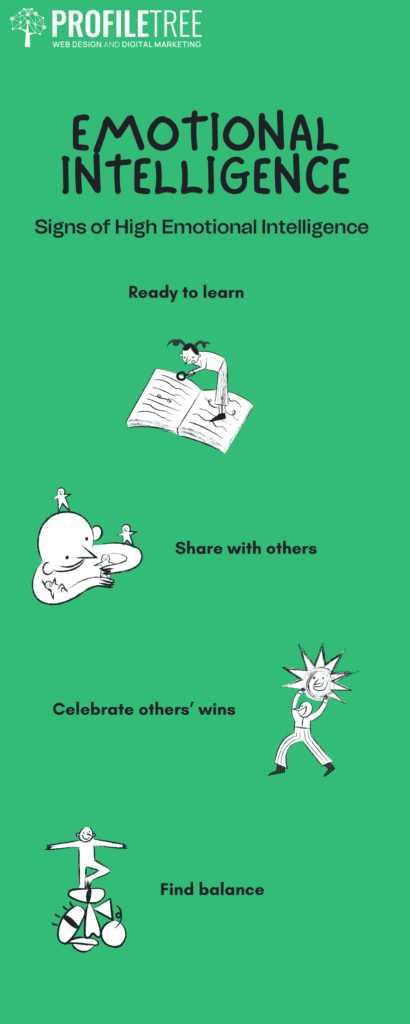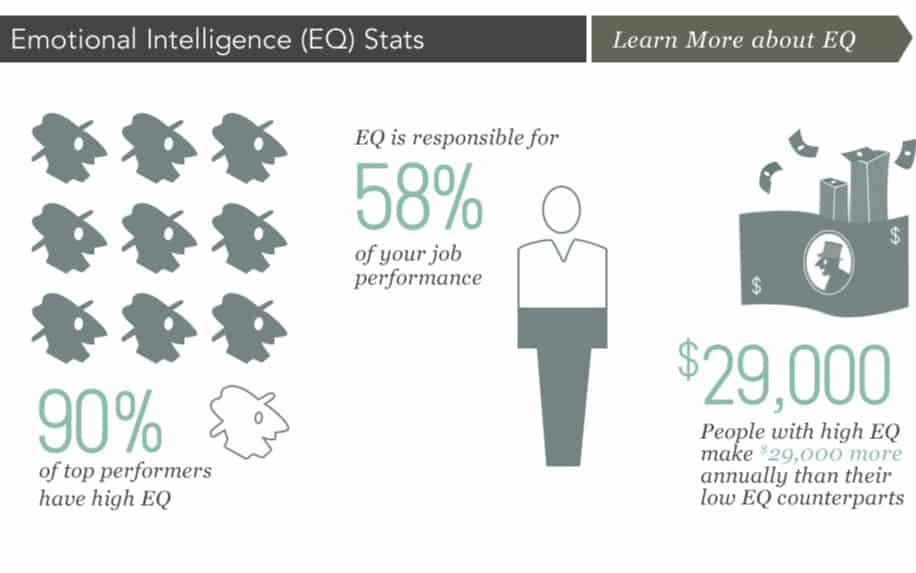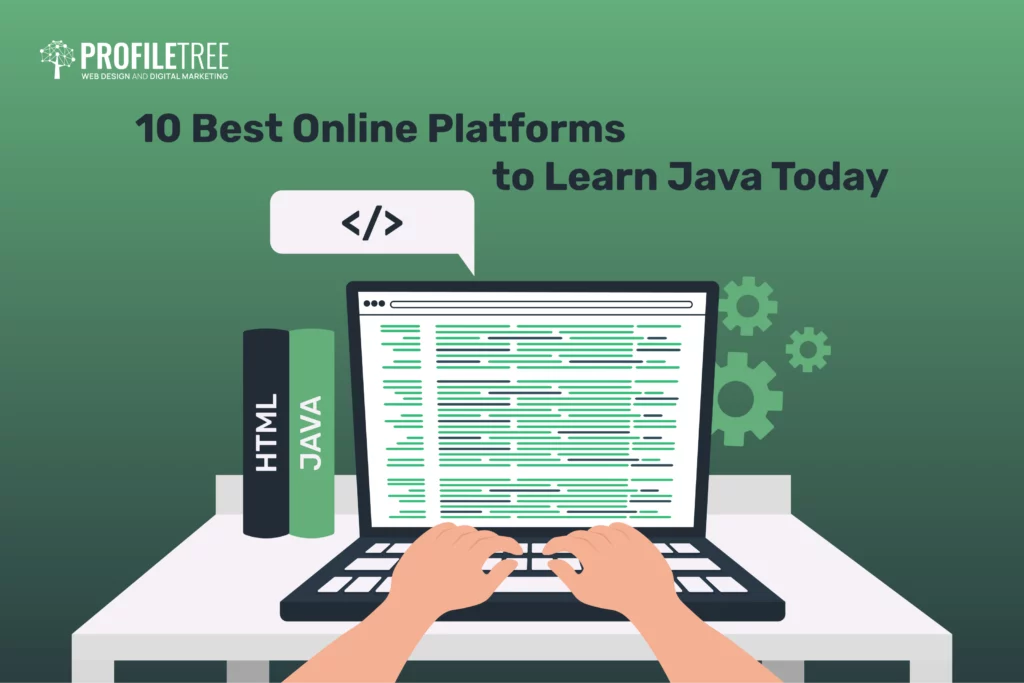Emotional intelligence in the workplace is a must if you want to be the best you can be in your career. Here’s why.
Let’s say you have two co-workers with you at the office, Colleague 1 and Colleague 2.
Colleague 1 is a pleasure to work with, level-headed and the epitome of professionalism. They understand when you’re having a bad day and will do their best to relieve the pressure on your shoulders.
Colleague 2, on the other hand, is the kind of co-worker you avoid when they’re in a bad mood. They tend to unload their mood on anyone in sight and won’t care what effect this has on others.
Even from this simple example, you can guess which colleague has emotional intelligence. And you can see clearly how being smarter with your emotional intelligence can bring real benefits for you and your team.

Table of Contents
What Is Emotional Intelligence?
According to the Institute for Health and Human Potential, emotional intelligence is the ability for a person to be conscious of their emotions and those of others, especially when under pressure.
You never really know who a person truly is until they’re put in hot water. Nor will you understand yourself except in situations under pressure. Another name for emotional intelligence is emotional quotient (EQ), which you’ve probably heard in a conversation or two.
Emotional intelligence is a personality trait where you’re aware of your emotions and are able to manage them whenever necessary. It works both on yourself and others, where you have to apply emotional intelligence in the workplace and in your personal life.
Personal development is a target that most individuals aim to accomplish in their lifetime, and emotional intelligence is the way to go.
By being emotionally intelligent, a person will be able to sort out through their stress and work well under pressure for efficient results. Emotionally intelligent people are also able to multitask, juggling your personal and professional life in a way that is rewarding for both ends.
Emotional intelligence is the fact that emotions influence our behaviour and the ability to manage them. It prevents a person from letting their emotions muddle with their thought process and, most importantly, not affect other people.
If you think that emotional intelligence is just a perk to improve your personal development or leadership skills, then we assure you that emotional intelligence in the workplace is a must.
Qualities of Emotional Intelligence
Being emotionally intelligent isn’t an easy thing to accomplish. It’s actually one of the hardest things to control because emotions are uncontrollable. Emotional intelligence is challenging to apply in your personal life because logic plays a big role in the process.
You’ll have to constantly be aware of other people’s feelings and your influence on them, whether they are intentional or not. As for emotional intelligence in the workplace, you’ll need to be able to take a step back and not get swept up in the heat of things.
Moreover, emotional intelligence in the workplace and in your personal life will increase your self-esteem and make you feel extremely confident. It will also help you further understand the actions of others.
You can proudly call yourself emotionally intelligent if you can:
Consider Your Feelings
This means that you’re able to manage your feelings and delve into the cause of your emotions. For example, if something bothers you, you think about why it bothers you and how you can overcome it.
You don’t let the anger take over and instead think clearly about the cause behind the anger itself.
Empathise With Others
Everyone gets upset when they see a sad advert on TV, but that’s not all empathy is. Empathy is the ability to feel other people’s pain and act accordingly, in a manner that is caring and considerate.
If you’re able to empathise with other people, then you’re giving other people a chance to open up and share their feelings with you.
Take Control of Your Thoughts
Fully controlling your emotions is not something you will ever be able to achieve, but your thoughts are another matter. You can’t control how you feel, but you can control your reaction towards these emotions.
You can do this by concentrating on the thought itself and not succumbing to your emotions. By doing so, you can harmonize your thoughts and actions to match with your goals and vision.
Pause
When you’re at an interview, one of the most common questions is to explain how you handled a difficult situation. The ideal response is pausing. In any challenging situation, it is tough to keep a clear head and be aware of your surroundings.
Emotional intelligence in the workplace, especially, requires you to pause and take a deep breath.
Keep your thoughts in order and evaluate the situation without letting your emotions affect you. The best method here is thinking thoroughly before you speak or act. This way you can avoid making a permanent decision based on a temporary emotion.
Apologise
In any situation you’re faced with, there are two sides to every story. Where there is harm, apologizing for hurting someone goes a long way.
We’re not saying that you apologize at the drop of a hat, but we are saying that when you apologize, you’re showing the other person that you value them and refuse to let your ego get in the way.
To be clear, by apologising to another person, you don’t necessarily have to be in the wrong. You are just able to look past the situation and recognise the importance of greater things.
Protect Yourself from Emotional Abuse
Everything in life has a dark side and emotional intelligence is not an exception. People act and react in situations to benefit themselves as much as possible. To some extent, this is human nature.
However, you’re going to have to be smart enough to avoid being taken advantage of. You should not abuse others for personal gain. You should also not allow anyone the opportunity to manipulate you for their personal gain.
Personal Development and Emotional Intelligence
You’re probably thinking, emotional intelligence is necessary for interacting with other people, but “what about me?” How does emotional intelligence benefit individuals?
Well, emotional intelligence is important for personal development and self-motivation. The importance of emotional intelligence is that it helps you avoid being a victim to your feelings and helps you achieve your goals clearly and consistently.
You’ll be able to enhance your personal skills and understand yourself better, pushing you to actualize your vision. Emotional intelligence in the workplace and at home will help you live a long and happy life, free of unnecessary worries.

If you ever thought about starting your own business or making a change in your life, then we suggest that you master the art of emotional intelligence to help you pursue these goals.
Because change is an inevitable aspect in your life, we suggest that you embrace it with your head held high.
Change is not necessarily a bad thing, because it helps you grow as a person. You will be able to overcome any obstacles that prevent you from being a better person, if you attain the capacity for emotional intelligence.
We understand that change is hard and scary for anyone, because the unknown is not something you’ll be fond of. But, we guarantee that the only way to keep going is to keep moving. As they say, you have to keep moving; you are not a tree.
Self-Motivation and Emotional Intelligence
An example of change would be the ability to start your own business, where you would be the boss and the employee in one neat bow. You’ll be able to control your thoughts with emotional intelligence in the workplace and control your outcome.
If you’ve thought about owning your own shop, it’s only one step to make that decision. The big step to having your own company is self-motivation, another trait of emotional intelligence.
Self-motivation and emotional intelligence are tangent factors to one another, because they revolve around maintenance. Self-motivation helps you push yourself harder and think about every action clearly, without being too rash.
Emotional quotient is the same thing, the act of being logical and understanding towards yourself and your surroundings.
As Leo Tolstoy once said, “Everyone thinks of changing the world, but no one thinks of changing himself.” Make sure that you are the exception to that rule, so you can change yourself and the world.

Emotional Intelligence in the Workplace
Self-growth is a challenge that you have to endure, with the guarantee of better results. You’ll be able to maintain relationships in a healthy manner and even increase your personal development at the workplace.
Emotional intelligence in the workplace is a very important quality to pull off because it means being in constant awareness with yourself. Hard as it might be, we’re here to help you understand why emotional intelligence in the workplace is important, if not necessary.
In any job, you’ll sometimes find yourself in a tough spot that you’re unable to get out of. But, if you are emotionally intelligent, then you will be able to deal with the circumstances handed to you with flying colors.
Being emotionally intelligent in the workplace, you’ll need to constantly be patient with your coworkers who have done something wrong or if they are too slow at performing a task. The key to success in any field of experience is emotional intelligence in the workplace. It helps you move further along in your career path.
According to a survey by Career Builders in 2011, 75% of managers would hire or promote employees with emotional intelligence in the workplace. In contrast, 59% of managers would not consider potential employees who are not emotionally intelligent.
Also, as mentioned above, emotional intelligence in the workplace encourages employees to motivate themselves and push themselves to their maximum potential.
Health Benefits and Emotional Intelligence
Emotional intelligence in the workplace, especially, can affect your mental and physical health. You will be able to sleep better at night because you are not burdened by any stress from your workload.
Emotional intelligence also influences a person’s sleeping pattern, and reduces fatigue and sleep deprivation. You can also reach out and share your feelings with your peers, which can help resolve issues in a placating manner.
Emotionally intelligent people will be able to understand the reactions of other people, due to their empathy, and, consequently, they will be more understanding to another person’s circumstances.
We’re trying to stress how important emotional intelligence is in the workplace to amplify your quality of work and quality of life.
Even with emotional intelligence in the workplace, there are benefits and drawbacks that you should be aware of. Yes, it is possible for there to be disadvantages of emotional intelligence in the workplace, here’s what they are:
Benefits of Emotional Intelligence in the Workplace
Being emotionally intelligent is a great advantage to have at the office, because it makes you comprehend situations and resolve conflicts easier and faster. Benefits of emotional intelligence in the workplace revolve around five main factors:
- Encouragement,
- Vision,
- Direct communication,
- Change,
- Leadership.
Emotional intelligence reprimands any discouragement or negative influence in your life. You can maintain your thoughts and be able to motivate yourself without the fear of doubt or uncertainty.
You can also encourage your fellow colleagues to increase their morale at the office, thus giving the environment a more friendly air. The more comfortable an employee is in their work space, the greater the work quality.
Emotional intelligence affects a person’s vision. Thinking clearly will do that to you. Emotionally intelligent people are able to create a realistic plan to achieve their goals and are persistent enough to actually achieve their vision.
Change and Emotional Intelligence
Direct communication is another benefit of emotional intelligence. You’ll be able to openly share your feelings and ideas, whether with your peers or your superiors. Emotional intelligence helps you understand the importance of sharing and direct communication.
You will be able to resolve issues between yourself and others, as well as maintaining a healthy connection with one another.
Considering that emotional intelligence in the workplace increases morale, you will be more adaptive to change. Emotional intelligence in the workplace will not show you how to change, but that it is possible.
With emotional intelligence, you will be able to use change as an opportunity for something better in the future.
Leadership is the final benefit in the workplace, which is a trait that most employers think highly of. You will never find a boss who will want a follower, but someone who takes charge.
Leadership in the workplace helps influence the team’s thought process and the business direction of the company. Emotional intelligence where one can control their actions and thoughts is evidence that one can handle more responsibility with professionalism.
Disadvantages of Emotional Intelligence in the Workplace
Drawbacks of emotional intelligence refer to an aversion of risk, emotional manipulation and reluctance to interfere with the status quo. When you are emotionally intelligent, you think and contemplate everything before you say or do something.
However, this limits you from thinking outside the box and taking a bold choice. Along with emotional intelligence comes the fear of getting out of your comfort zone and constantly staying on the safe side.
You can also find yourself reluctant to step on anyone’s toes. Because you have compassion and empathy as an emotionally intelligent person, this could lead you to being too timid, not wanting to annoy or bother anyone.
Therefore, you will be carrying the responsibility by yourself.
Finally, emotional manipulation is the worst drawback of all. Emotional abuse has a long term effect and can be very hurtful. The manipulation of emotions is the act of interacting in situations in a way that will maximize personal gain without considering others.
Emotional intelligence tends to trigger this behavior in manipulators because they may consider you an easy target who won’t retaliate. People can, in fact, act in a certain way to get you to do what they want.
Leadership and Emotional Intelligence in the Workplace
As John C. Maxwell states, “A leader is one who knows the way, goes the way, and shows the way.”
Leadership is a necessary quality that correlates with emotional intelligence in the workplace. A leader tends to understand their team, guide them in the right direction and initiate future objectives into reality.
Leading with emotional intelligence is the management of tasks and the ability to push employees to achieve their full potential. You should know that by achieving emotional intelligence in the workplace, many of your peers will look up to you for guidance and help.
Being a leader has its own disadvantages. It takes a lot of mental clarity and responsibility to take on the role of a leader. So, you have to be prepared in order to take on the challenge to direct your colleagues into future projects and objectives.
How to Improve Emotional Intelligence in the Workplace
Once you’ve mastered emotional intelligence in the workplace, it is up to you to maintain that state of mind. You will have the ability to control your thoughts and actions towards yourself and other people.
You’ll be aware of other people’s emotions and learn to empathize with them on a less superficial level.
You will also have the drive to motivate yourself and take charge of your life, both professionally and personally.
Improving emotional intelligence in the workplace is quite simple. It is all about your interactions with other people and how you maintain your relationships with them. You can be able to ask more personal questions to show that you are interested in your employees’ lives.
This shows them that you care about their lives and the issues that they face.
We suggest that you keep more questions open ended. Instead of going for a yes or no question, try asking people questions that give them the space to explain and share with you.
You can improve your emotional intelligence by using the right tone when you are dealing with other people.
You should use the right tone in every situation. You’ll be able to control the intensity of interactions and relationships between yourself and other people.
Once you’ve gotten the hang of emotional intelligence and its perks, you will find it easy to maintain your relationships and you’ll be able to sleep better at night.
Summary: Emotional Intelligence in the Workplace
Emotional intelligence is the ability to be aware of your own emotions and other people’s emotions. This helps you to take control of your actions and thoughts, resolving issues in a peaceful and efficient manner.
Emotional intelligence in the workplace is important because, at the office, you’ll find yourself in a lot of pressure-filled situations.
We suggest that also you try, however, your best not to be emotionally fragile, in a way that other people would manipulate you because of your empathy and compassion. Along with empathy and compassion, leadership is another skill related to emotional intelligence.
Finally, once you have achieved emotional intelligence in the workplace, you should work on maintaining it. You should do your best to accept the change in yourself or in your surroundings, by using emotional intelligence.
In the end, it all begins and ends with you.


